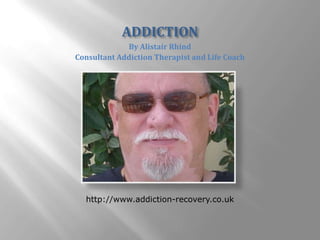
Understanding Addiction
- 1. ADDICTION By Alistair Rhind Consultant Addiction Therapist and Life Coach http://www.addiction-recovery.co.uk
- 2. Addiction If you are reading this because you or your partner has a problem the most important thing you need to know is that recovery is possible.
- 3. Addiction Addiction is characterised by ambivalence and deluded thinking Like Dr Jekyll & Mr Hyde The addict experiences two types of thinking Rational Thinking Irrational deluded Addiction thinking
- 4. Addiction We talk of the baffling nature of Addiction because it is a mystery to those affected by it. Addiction baffles people on the sidelines The Addict continues to use or drink despite the damage being caused They seem oblivious to what seems obvious to the rest of us
- 5. Addiction Family & friends ask questions like: What causes it it? Is it a weakness? Why can’t they just stop? Are they just being willfuland wicked? Is it my fault?
- 6. Addiction Are they bad people? Can they get better? Will they ever quit? Why can’t they just control it like other people? If they really loved me wouldn’t they just stop? Are they really angry because I’ve done something wrong?
- 7. Addiction A child asks; what have I done to upset Daddy? What is wrong with me? Is it my fault that things feel so bad at home? Everybody suffers when addiction is present
- 8. Addiction This list of questions is virtually endless but always around the same theme; the baffling nature of addiction. And it is for most people a baffling condition – even many health professional are in the dark about the nature of this problem
- 9. Addiction This confusion manifests in the form of ambivalence - two opposing feelings and beliefs about the addictive behaviour. “I want to drink/gamble/use/overeat etc - I want to stop hurting and the problem to go away” “I want my best friend - I don't want it to control me” “I want to quit – I want to not quit”
- 10. Addiction The addicted person will typically find themselves saying “That’s it, I quit, I can’t stand this anymore.” then later in the day or that week or perhaps next week their thinking has changed completely: “Maybe I could have just one, I’m in control, its my life, who cares anyway, I’m my own boss.”
- 11. Addiction The net result is a return to the addictive behaviour - the drinking, gambling, starving, drug taking and so on.
- 13. Addiction Relatives and friends feel confused, angry, let down and hurt and the addict feels temporarily justified in his behaviour, swiftly followed by more remorse and then confusion – he or she asks of themselves - who am I and what do I really want? The Addict is confused and lost and feels terribly alone
- 14. Addiction Lost & Alone
- 15. Addiction Addiction Counselling or rehabilitation seeks to end this confusion for the addict enabling them to feel more certain about what they want to do about their addictive behaviour. The goal is to help them find their will again and to understand the nature of the lies and delusions built into all addictions.
- 16. Addiction Without intensive professional and expert help, the addict continues to suffer from delusions and is locked into his/her destructive behaviour.
- 17. Addiction With help they can learn to permanently change their destructiveness and to feel good again.
- 18. Addiction Help is the most important thing that the addict and his family need. Get Help Now - it will make a difference
- 19. Addiction Produced by The Rhind Practice Addiction & Life Coaching Consultants http://www.addiction-recovery.co.uk